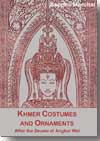| Our Publications | ||
| Books by Title | ||
| Books by Author | ||
| Books by Country | ||
| E-books | ||
| About | ||
| Orchid Press E-books | ||
| Distributed E-books | ||
| Our Bookshop | ||
| About Us | ||
| Browse Shop | ||
| How to Buy | ||
| Contact Us | ||
| WE BUY BOOKS AND LIBRARIES | ||
|
||
Book Reviews

Khmer Costumes and Ornaments:
After the Devata of Angkor Wat
bySappho Marchal
(translated from the French by Merrily Hansen)First English edition Orchid Press 2005. (1st French edition, 1927) 128 pp., 44 b & w pl., including numerous line drawings, 21.5 x 15.2 cm., softcover.
ISBN-10: 974-524-057-5 $16.00
ISBN-13: 978-974-524-057-5
A long lost gem of Asian history, art, culture, fashion & feminine style
Book review by Kent Davis
(www.devata.org, 13 February 2009)
Marchal’s visual meditation is a gem to treasure for the images it holds and the ideas it will inspire. While the topic of Khmer adornment seems to occupy a narrow niche of knowledge, the fact is that it holds great appeal for a broad range of people. Indeed, the worlds of Asian art, fashion, history, jewelry, graphic design, feminine style and culture all intersect in this compact 99 page work.
This book revolves around 41 plates with line art drawings of the “apsara” or “devata” carvings at Angkor Wat in Cambodia. More than 1,800 of these woman were immortalized in sandstone between 1116-1150AD. Some experts characterize the figures as “celestial nymphs” or demi-goddesses called “devatas” but these terms were applied long after the fall of this civilization. The truth is that the identity and meaning of the “devata” remains a mystery.
What is undeniable is the beauty, life and energy the carvings radiate. Some art historians see the Angkor civilization as the pinnacle of artistic expression in Asia. Dr. Paul Cravath of the University of Hawaii elegantly captured the essence of the “devata” when he wrote, “There, with stupendous variety, the Feminine achieved a new level of expression unsurpassed at any time in Asian sculpture.”
In 1927, Sappho Marchal published her original work in Paris when she was only 23 years old. Sappho was in a unique position to study Angkor Wat; her father, Henri Marchal, was appointed the second curator of the vast Angkor site for the French colonial government in 1916. Sappho grew up with these extraordinary Khmer women.
Seeing the devatas through this young lady’s eyes holds immense value for researchers of art and history alike. Mlle Marchal highlights details of their hair, costumes and ornamentation that archeologists, in their mad rush to measure large stones and determine stellar alignments, have never paused to notice. Her sensitivity and attention to detail is refreshing. In fact, there is no other volume that offers this degree of analysis for these important carvings.
Merrily Hansen’s 25 years of educational publishing experience resulted in an excellent translation and flawless plate reproductions for this rare volume’s reprinting. For those interested in Southeast Asian, Thai and Cambodian art this book is indispensable.
But the truth is that this is a beautiful book for anyone. It offers inspiration in design and feminine style, and a pleasant meditation on one of the most beautiful art mysteries in the world.
[Read a review from The Nation] [Read a review from Cambodia Book Reviews] [Read a review from Amazon.com] [More Orchid Press Reviews]
PO Box 70, Trinity TB, NL, A0C 2S0, Canada
Telephone: +1 709-330-4703